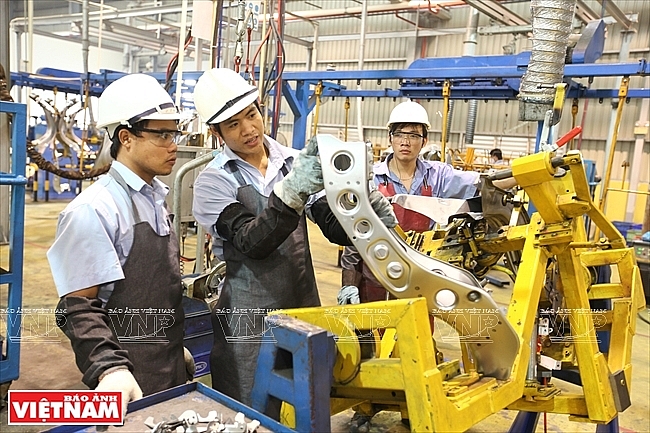CPTPP to improve Vietnamese labour rights
 |
| The CPTPP will bring Vietnam closer to ILO standards, illustration photo - source: Bao Anh Viet Nam |
The CPTTP, along with the EU-Vietnam Free trade Agreement, sets specific rules concerning labour rights and working standards, targeting stable economic growth alongside ensuring that workers and enterprises benefit equally.
New-generation free trade agreements require participants to comply with the International Labour Organization's (ILO) 1998 Declaration on the Fundamental Principles and Rights at Work. They are embodied in eight core conventions of the ILO that underpin four key fundaments, namely the freedom of association and the effective recognition of the right to collective bargaining; the elimination of all forms of forced or compulsory labour; the effective abolition of child labour; and the elimination of discrimination in respect of employment and occupation.
These labour rights are reported to significantly improve gender equality, increasing women’s access to the labour market and narrowing the gender wage gap in certain instances. Moreover, there is no evidence that such labour provisions divert or decrease trade flows or have otherwise been used regarding protectionist purposes.
Chang-Hee Lee from ILO Vietnam emphasises: “This is really an opportunity for Vietnam to modernise its labour laws and industrial relations system, and the need for such reforms firstly comes from the country’s internal context.”
Another ILO research even reveals that a trade agreement including labour provisions increases trade value by 28 per cent on average, rather than the 26 per cent for an agreement without labour provisions.
Despite improvements in the legal framework governing labour and industrial relations, Vietnamese workers have seen little improvement and the solutions issued have yet to show comprehensive effects, as more than 6,000 lightning strikes have occurred since the mid-1990s and none of them were initiated by trade unions.
Most trade union leaders are senior managers, which would be unacceptable in almost all countries in the world. As the CPTPP is put into operation, it is expected that workers will be allowed to establish or join organisations of their own choice and these organisations might not need to be part of the Vietnam General Confederation of Labour (VGCL).
However, ILO rules also state that the organisations established by workers must obey their home country’s constitution and laws, operate within the purview of their registered operations, and protect the rights of the labour force through solely legal means.
During the discussions at the NA on November 2, vice president of VGCL Ngo Duy Hieu said that independent trade unions will inspire VGCL to continue reforming and improve its efficiency to do a better job as the representative of workers.
On November 12, 469 NA deputies passed the resolution approving the CPTPP and associated regulations. With no objections or abstentions, all present legislators (96.7 per cent) voted in favour of approval, while 16 members (3.3 per cent) were absent.
The results officially mark Vietnam as the seventh signatory to ratify the deal, after Mexico, Japan, Singapore, New Zealand, Canada, and Australia.
The CPTPP is going to form a market of 500 million consumers, which is expected to increase Vietnam’s GDP by 1.32 per cent by 2035, according to the Ministry of Planning and Investment. At the same time, the agreement will also open doors to progressive, free, and fair trading, where enterprises are safe from trade wars.
What the stars mean:
★ Poor ★ ★ Promising ★★★ Good ★★★★ Very good ★★★★★ Exceptional
Related Contents
Latest News
More News
- State corporations poised to drive 2026 growth (February 03, 2026 | 13:58)
- Why high-tech talent will define Vietnam’s growth (February 02, 2026 | 10:47)
- FMCG resilience amid varying storms (February 02, 2026 | 10:00)
- Customs reforms strengthen business confidence, support trade growth (February 01, 2026 | 08:20)
- Vietnam and US to launch sixth trade negotiation round (January 30, 2026 | 15:19)
- Digital publishing emerges as key growth driver in Vietnam (January 30, 2026 | 10:59)
- EVN signs key contract for Tri An hydropower expansion (January 30, 2026 | 10:57)
- Vietnam to lead trade growth in ASEAN (January 29, 2026 | 15:08)
- Carlsberg Vietnam delivers Lunar New Year support in central region (January 28, 2026 | 17:19)
- TikTok penalised $35,000 in Vietnam for consumer protection violations (January 28, 2026 | 17:15)

 Tag:
Tag:

























 Mobile Version
Mobile Version